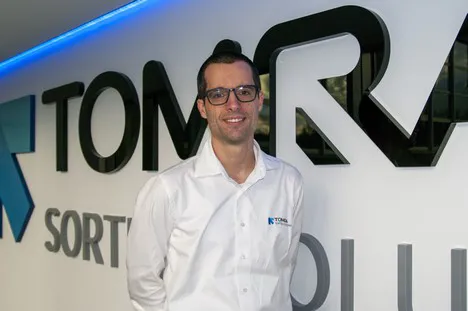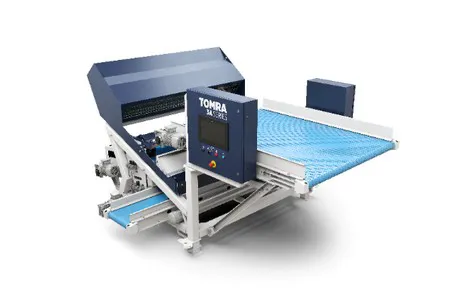The machine sector in the fresh produce industry is becoming more and more competitive, so how can companies keep ahead of the game with new technologies, which still making them affordable to growers and processors in these uncertain economic times?
“We operate in a lot of markets but if you look at the trends of last year it has been very interesting with the ongoing trade wars, political situations and Brexit which have affected the economy. People are watching what is happening and finding other ways of doing trade when regular routes are compromised,” explains Bjorn Thumas, VP Bus. Dev. & Prod. Mgmt. Food Sorting & Marcom Food & Business Development, at TOMRA Food.

“Investment is a risk for companies at times like these, but we have seen that people can be very creative in finding ways to still do business. Our positioning and our solutions have allowed them to think outside the box and still to optimise their produce. The modular aspect of our machines allows them to adjust to new requirements and can help people to become more competitive and create new markets where they can rise above their competition and show their supplier that they are making the difference.”
These days the consumer is becoming more informed, knowing what they want, wanting to know where the product comes from and how it is processed. Sustainability is a big driver, as is reducing food waste, so producers want to link to companies which they know are standing for a good cause not just for the sake of profits.
“As well as offering efficiencies, our products are able to ensure the process is reducing food waste and energy consumption, this is possible because of our knowledge about the market sector that we are in and because we understand our customers and the issues they are facing. We can advise them, there are so many parts to a process line where you can incorporate these elements and knowing the intricacies of their business, we can really make a difference.”
Standing out from the competition
“We are a global company and we need to be able to support our customers and be set up for the smaller companies as well as the big ones, they all deserve the same service and want more than just someone who is out there trying to sell machinery, you have to think with the customer. TOMRA offers a large range of products which gives our customers choice, as we cover the processing market as well as the fresh market. We don’t have to limit ourselves to one type of technology. We offer a wide variety of solutions. To provide the right and precise sorting solution, we start working from the broad application, customize the mechanical and technological needs for our customers’ particular product, and then fine-tune the sorting machine with the needed core sorting components, including sensors, electronics, software, and ejection modules. It’s this balance of broad technological application and customized expertise that makes TOMRA the leader in sensor-based sorting.
Emerging markets
In emerging markets Thumas says it’s about finding your own presence but also being smart and collaborating with local partners.
“We try to do our homework and perform feasibility studies we also talk to the customer and are aware of the limitation, while not assuming things. We have some very smart & passionate people working at TOMRA Food. It is amazing what we can achieve and make a difference.”
New markets
Automation is getting a lot of attention now due to lack of labour. “Even in the categories where we are already working, we are always trying to find out what else is out there and how we can help our customers.
“In some areas of the world there is still a lot of labour available and that has not changed much in the last ten years, but they face difficulties finding people who still want to do the job. Automation can help as machines don’t get tired and don’t make mistakes, but we need to make sure that people can operate, run and fine tune the sorting solutions in order to get the most out of them. It is double-sided as we need to get the best technology out there but at the same make sure that the machine is easy to operate so that a basic operator can get the most out of it. It’s all about finding the right balance.

TOMRA 3A
This year TOMRA Food launched a new sorter, the TOMRA 3A which is mainly targeting the potato industry. It is aimed at the front end, just after harvest, before the potatoes are brought into the packhouse.
“We had a request to develop something better than what was already available: firstly, to remove foreign material, which remains critical for a lot of our customers who supply the processors who are increasing their specs, and also different capacities to accommodate smaller growers as well as the larger ones. We have also been able to introduce some colour sorting capabilities so we can focus on greening issues which is a critical defect in the French fry industry.
One of the reasons TOMRA Food came up with this new platform is that it is a lot more robust than its predecessor, which is necessary when it is out in the open field. Currently the target product for the TOMRA 3A is potatoes but it will be able to run onions In the near future as well.
It has been launched in Europe and will soon be launched in the US, at Potato Expo.
For more information:
Marijke Bellemans
TOMRA Sorting NV
Tel: +32 (0) 16 742 817
marijke.bellemans@tomra.com
